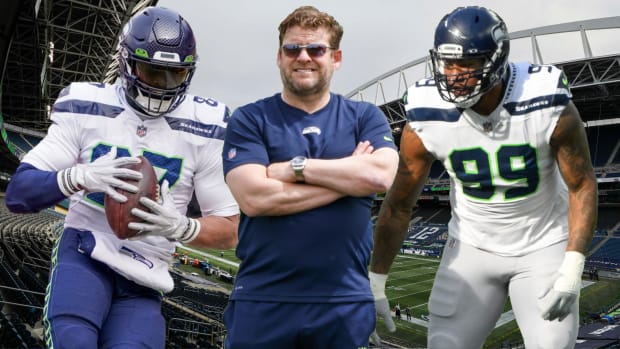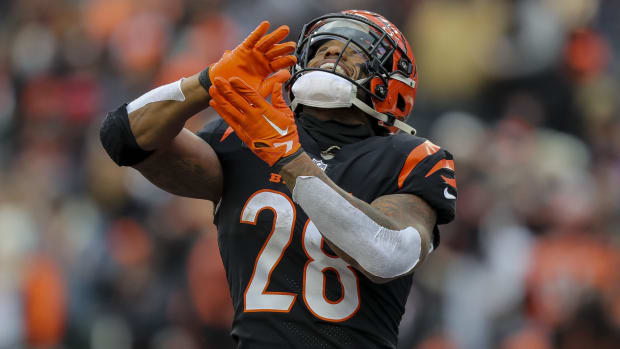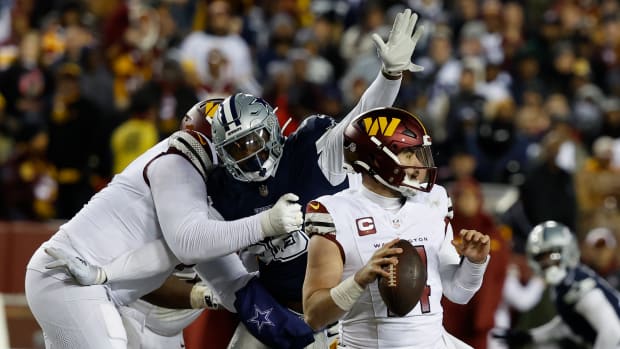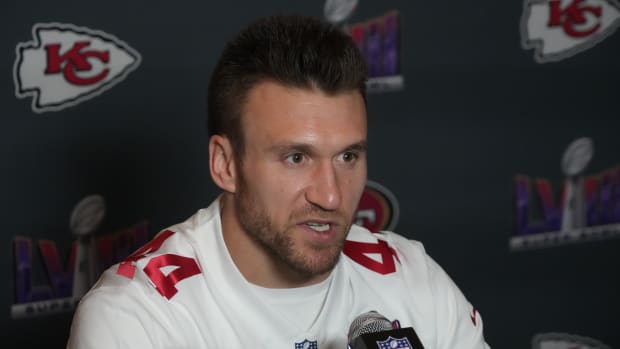How did Aaron Rodgers slip to No. 24 in the 2005 draft? Inside the tumble
On Sept. 11, 2003, two relatively unknown quarterbacks faced off in Salt Lake City in an early season, nonconference matchup. Alex Smith and the Utah Utes won the game, 31-24, beating a junior-college transfer, Aaron Rodgers, despite his 224 yards and two touchdowns for the Cal Golden Bears.
A year and a half later, Smith and Rodgers had emerged as the top two quarterbacks in the 2005 NFL draft, and in the days leading up to April 24, the question of who would be selected first was at the forefront of the NFL discussion. Which quarterback was a product of his system? Which had the right mentality to lead a winning team? There was no consensus to these borderline-unanswerable questions, and though Smith’s stock began to edge out Rodgers’s in the days leading up to the draft, no one could have predicted what would happen on that final Saturday in April.
• 2015 NFL Mock Draft: Gurley on the rise | NFL draft Big Board: Our Top 64
At the time, it was shocking—not that Smith was picked first, but that Rodgers fell to Green Bay at No. 24. Looking back 10 years later, it’s borderline unbelievable. Of the 23 players selected before Rodgers that day, only Demarcus Ware (8) has been voted to more Pro Bowls than the Packers’ quarterback (4)—a fact that’s even more astonishing considering Rodgers has been a starter since only 2008.
Explain it however you wish: that the 20 teams between the 49ers and the Packers (Minnesota and Dallas got two shots at Rodgers that day) didn’t need quarterbacks, that Rodgers’s experience (one season at a junior college and two in Berkeley) was insufficient, that Smith looked better on paper. Regardless, one fact is impossible to argue: Knowing how Rodgers’s career progressed, there’s likely not a team among the 21 that picked before Green Bay that would have passed on the 6’2” quarterback out of Cal.
“Quarterback is the hardest position to analyze,” the NFL Network’s Mike Mayock says now. Need evidence he’s correct? Read on.
***
In the winter and early spring of 2005, Rodgers, a Chico, Calif. native, was seen as the popular hometown pick for the 49ers, who had finished with a miserable 2-14 record in 2004. As the pre-draft process began to churn, many believed Rodgers’s northern California roots would push the Niners to choose him first over Smith.
Rodgers, in a January 2005 press conference to announce his departure to the NFL: Obviously the 49ers were my first love. It would be great playing for a Bay Area team, in front of Cal fans.
Edward Rodgers, to the Sacramento Bee in April 2005: With Aaron's popularity in the Bay Area, I bet he'll pick up 10,000 tickets.
Mark Kreidler, Sacramento Bee writer, in an April 23, 2005 story: Drafting Aaron Rodgers, the Chico kid who grew up rooting for the franchise, sure looks obvious. It's a subtle kind of smart, doing the obvious thing.
• NFL draft trade rumors: Deals we want to see happen | Latest NFL buzz
As the draft approached, the 49ers started dropping hints that Smith was their guy, although other teams and scouts viewed those hints as potential smoke screens. Questions—however unfounded—about Rodgers had begun to emerge, and overall, he was drawing less interest than Smith. So by indicating they were leaning toward the Utah quarterback, the 49ers could have been feeling out the market for a trade. If Rodgers really was their guy, it would have been feasible for them to drop a few spots in the draft via a trade, gain an asset and still draft him.
Ira Miller, San Francisco Chronicle writer, in an April 10, 2010 story: Alex Smith has more size, may be the better athlete and—scouts love this word—is said to have a bigger “upside.” Rodgers has a certain air of confidence about him, a good thing for a quarterback who will be drafted by a bad team. Smith is considered more cerebral.
Anonymous NFC scout, quoted in an April 19, 2005 Green Bay Press-Gazette story: I just think Aaron's the product of being on a good team. … I see Utah winning because of Alex Smith. He's the one that does it. I don't think Cal was winning because of Aaron Rodgers. He contributes to it, but I don't think he's the team.
Russ Lande, former NFL scout, current analyst at 120Sports: [Smith] was sort of the first of all these spread quarterbacks, where everything he does looks fantastic because he gets to throw to wide-open spaces. [At the time, everyone noted that] he’s a tremendous athlete with a capable arm, and he’s a smart kid. … He’ll be a rock star [they said]. The thing we didn’t know as a league was how hard the transition would be to going from that offense to… a traditional offense. … Clearly, it took him five or six years before he became an average passing quarterback.
Joel Bussert recalls 40 years of NFL draft memories, oddities and more
The [speculation] was all over the place, obviously. We joked around about it a little bit, but honestly, I feel like it was so prevalent that we just kind of became immune to it at that point. I think Aaron was just kind of able to block it all out.
Jeff Tedford, Rodgers’s coach at Cal: You know, it was kind of up in the air. You heard back and forth about yes he was [going to the 49ers], and now he wasn’t, that type of thing.
Alex Smith: The week leading up I had a good idea [I’d go first], just based off of different scenarios. Back then, they were trying to negotiate those contracts before the draft, and the way that was going I felt good about it the week leading up.
Lyman: People ripped on [Rodgers] for [holding] the ball too high. … [It] allowed him to have a quicker release, and to me [the criticism] did not make any sense. … Everyone was saying how they needed to change his setup, and I think everyone around Cal was like, if it’s not broke, why are they trying to change his whole system?
The thing that always surprised me was, [detractors] always said that Aaron was a product of Jeff Tedford’s system. I never understood that. I sat there, and I watched him throw every day, and I don’t care what system you play in, if you … watched the guy throw and watched him move and saw how athletic he is, you knew he could play football and knew he was a high-caliber quarterback.”
Lande: [Tedford] was just such a brilliant quarterback coach. He’s been able to mask flaws in other quarterbacks that failed in the NFL [Trent Dilfer, Akili Smith, David Carr, Joey Harrington, Kyle Boller], which is a red flag for NFL teams.
Because of him playing in that system, you rarely saw Aaron have to manipulate the defense with his eyes. You rarely saw him have to move safeties, things like that. … [Other] scouts I talked to had concerns about arm strength, which was not something I was concerned with.
[pagebreak]
Tedford: A lot of it didn’t make any sense to me. … He was very efficient, very accurate, had great arm strength. All the so-called experts [said], “Oh, he didn’t throw the long ball well,” but they didn’t have, in my opinion, anything to go by with that. His workout was excellent, his footwork, all the things fundamentally to me.
Mayock: [I didn’t see] major red flags. It’s a little bit similar to the conversations we have today about the quarterbacks coming out of spread offenses. We need “meaningful throws,” throws that aren’t bubble screens. I remember charting a lot of Aaron Rodgers’s throws, and a big percentage were within 10 yards of the line of scrimmage, which is similar to today’s spread. And … there was some criticism of the Tedford quarterbacks. They were system quarterbacks.
Audibles Podcast: Breaking down our 2015 NFL draft All-Tape Team
Lande: I think now, both [Smith and Rodgers] would be scrutinized more because of the lack of having to function in a traditional pocket and make all of the reads. I think both would probably slide if they were coming out now, [they] would go in the 15-20 range.
Mayock: When it comes down to it, I don’t think it’s fair to the kid to generalize like that. I have to get out of my comfort zone when [I] see these spread quarterbacks.
Those who attended Rodgers’s pro day remember it as being flawless, yet that didn’t assuage any of the public concerns about his game. Even so, there was no question: if Smith were to go first, Rodgers would be the second quarterback taken. As teams prepared for the draft, those with picks beyond the top 10 assumed both players would be long gone by the time they went on the clock.
Kreidler: [The 49ers should] draft Aaron Rodgers because he's very good—not great, but very good.
Mayock, in the lead-up to the 2005 draft: I think what Aaron Rodgers is, is he's a highly proficient, technical quarterback who can manage a game. [He] has an above-average arm and can be a good player in the right system. I don't think he is an All-Pro type quarterback, though.
Reggie McKenzie, Raiders general manager and former Packers director of player personnel: We had no idea that he [Rodgers] would be there at 24. We were wrapping our minds around who would be there, but we definitely did not see him as a 24th pick in the draft. … The coaches did not think a quarterback would be there either. They think this guy’s going to go in the top five, and at 24, we had no ammunition to move up into the top five for our draft pick.
We didn’t spend a whole lot of time on him. It’s not like we brought him in for interviews. In our mind, he was gone. We knew enough of him just from the combine and our scouts and coaches who went out there and saw his pro day.
Mayock was the one person in the NFL stratosphere who thought Rodgers would still be on the board at 24 and would go to the Packers—and most everyone then thought he’d lost his mind. As late as the morning of draft day, Rodgers seemed to be a consensus top-five pick, with Miami, Cleveland, Chicago and Tampa Bay holding picks No. 2-5, respectively.
NFL draft backup plans: Where teams should turn if Round 1 plans go awry
Mayock: If you believed like I did that Alex Smith would go No. 1, then the question became, OK, even though they’re really close, where are the pressure points where Aaron Rodgers could go? Me having him slide as far as I had him slide on the surface kind of sounded stupid, but the more I looked at it and studied it, the more I kind of felt like, Hey, if he doesn’t go here or here [Mayock cannot recall which teams those were 10 years later]… then it’s going to be a long slide unless somebody trades up to get him.
At 10:25 a.m. ET, the 49ers made it official: Smith would be the draft’s No. 1 selection. At 11:21 a.m., one of the first greenroom shots of Rodgers was broadcast on ESPN, as he waited to see whom the Buccaneers would pick at No. 5. (It would be Cadillac Williams. Ronnie Brown had already been selected at No. 2, Braylon Edwards at No. 3 and Cedric Benson at No. 4.)
Those greenroom shots of Rodgers are the most memorable moments of 2005’s draft broadcast. At 1:40 p.m., ESPN showed Donovan McNabb’s mother consoling Rodgers’s mother; at that point, Rodgers still had more than an hour to go before he was picked. In total, the soon-to-be Packers’ quarterback waited a full four hours and 18 minutes after Smith’s name was called before hearing his own.
Lyman: It was so uncomfortable for everybody. They kept showing him in the greenroom, and those picks are so long in the first round, that three hours went by, and it felt like 12 hours. Nobody wanted to text him or reach out to him. It was like, let’s let this thing play out.
Tedford: Leading into the day, I think it became a little bit clearer, like the day before, that [the 49ers] may not [pick Aaron]. And once that didn’t happen, nobody had any idea who needed a quarterback, who didn’t, who’d take the next quarterback.
McKenzie: Once he got past 15 or so, we were… looking at some of those other teams [ahead of us] and feeling like [a quarterback] was not a need for them. [Rodgers] could be a possibility. And the closer and closer it got, our discussion was that he could fall to us.
Mayock: John [Schneider, former Packers personnel analyst and current Seahawks general manager] and I have had a few laughs about that over the years, because he heard my evaluation on my mock draft prior to it [the draft], and he thought there was some merit to it.
McKenzie: Needless to say, we were ecstatic that he was still there. A lot of people thought, well we’ve still got Brett Favre, but that was by far the best player on our board, and we just took the best guy.
The bottom line was he had a live arm, and he has great feet, could move around, could run. [He has] big hands, so we felt like that was a major plus, playing in the cold weather. … Plus, the quick release and how strong he was. He had all the intangibles to go along with the physical traits. There wasn’t a whole lot of negatives that we saw in him.
McKenzie does recall a brief debate over picking someone other than Rodgers—Brett Favre was coming off a 4,088-yard, 30-touchdown season, after all—but the conversation was short. Coaches offered some resistance, he says, to picking a player who would have no immediate impact, but even that was short-lived. It simply didn’t make sense to pick anyone other than Rodgers.
Mayock: It’s a little bit like a Drew Brees situation today. New Orleans has [picks No.] 13 and 31. I’m not trying to say they’re going to take a quarterback at 31 … but the point is the same thing. It’s no different than New England taking Jimmy Garoppolo in the second round last year. You get a quarterback of a certain age, and you have to start thinking, as painful as it is, about [a replacement].
Tedford: I think [Rodgers] could have started anywhere he went. That’s who he was. It wasn’t that he needed to stay [back]. It was just an added bonus that he had the luxury to take the time.
Lyman: The first thing you think of is, O.K., Aaron is going to have a chip on his shoulder for the rest of his career, and he’s going to be out to prove everybody wrong. So the rest of the league better watch out. … Then you think that he’s obviously later in the first round, so he’s going to go to a better team with a better record. So that’s probably not a bad thing.
Tedford: The feedback I got was [that it was] more of a personality conflict [with the 49ers]—or maybe conflict’s not the right word. But the team, on a personality thing, ended up preferring Alex over Aaron. … I heard rumors, but I don’t know what the tipping point was. Aaron was a real confident guy, [and maybe they wondered if it was] borderline arrogant? I don’t know Alex. Who knows how much that was really coming from the 49ers. I don’t know. It was all kind of rumors after the fact.
Lorenzo Alexander, Cardinals linebacker and former Cal player who trained with Rodgers for the draft: Aaron was California swag before California swag was even a thing.
McKenzie: We didn’t see it as a negative, for sure. Nobody said he was a bad guy because he could be confident and cocky. Not in a negative sense. That was not him. We did not hear about him being a bad teammate. … You can kind of over-analyze that. … He was a great teammate, extremely smart, definitely confident in his abilities. And he should have been. He has a lot of ability.
The Packers using their first-round pick on Rodgers represented a shift in how they viewed their future. It was the first time they’d selected a quarterback who might actually be in line to replace Favre, who was 35 but had given no hint that retirement was imminent.
Rodgers spent three seasons on Green Bay’s bench, attempting a total of 59 passes over that time. But when Favre announced his retirement on March 4, 2008, the job was finally his. Rodgers’s first season under center was rocky—Green Bay went 6-10 and Rodgers threw a career-high 13 interceptions—but since then, he’s made the postseason each year, winning the Super Bowl in 2011 and coming within a split-second of another shot to do so last January.
Smith, meanwhile, has put together a respectable career in San Francisco and now Kansas City, and his accomplishments make it difficult to fault the 49ers for their choice a decade ago. They picked the player they thought fit them best. It’s the rest of the teams that had a shot at Rodgers—and ultimately deferred for the likes of Erasmus James, Troy Williamson and Travis Johnson—who must be kicking themselves.
Rodgers, after all, gets the last laugh; he has a 61-30 career record against the teams that passed on him.




































